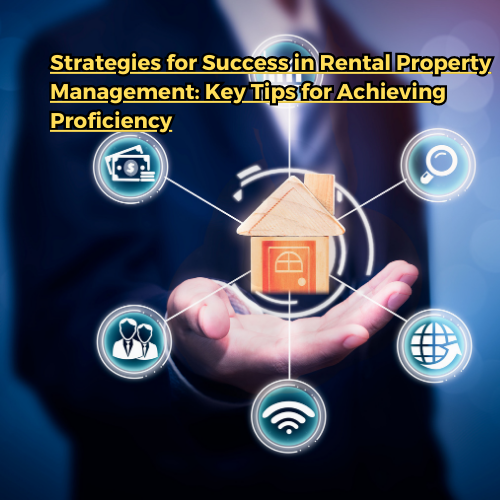The purpose of this introductory section is to provide an overview of the topic at hand and set: The ownership and management of rental properties can present a lucrative investment opportunity, providing a consistent flow of revenue and the possibility of sustained expansion in the future. Nevertheless, the successful management of rental properties necessitates the implementation of a strategic methodology, meticulous attention to intricate aspects, and a steadfast dedication to ensuring tenant contentment. This article aims to examine crucial strategies for effective management of rental properties, which can assist property owners in effectively addressing obstacles, maximising their investment, and fostering enduring tenant relationships.
- Comprehensive Evaluation of Prospective Tenants: The cornerstone of effective property management for rental units is predicated upon the careful and judicious selection of tenants who possess a track record of dependability and accountability. Conducting comprehensive evaluations of prospective tenants, which encompass background checks, credit reports, rental history, and employment verification, can effectively mitigate the likelihood of encountering difficulties related to rent payment delinquencies and property damage.
- Lease Agreements that are Transparent and Thorough: The development of a meticulously constructed lease agreement is of paramount importance as it serves as a vital instrument in establishing clear expectations and delineating the obligations of tenants. Ensure that all crucial elements are addressed in the lease agreement, encompassing the stipulated rent amount, designated due date, maintenance responsibilities, as well as policies pertaining to the presence of pets, subletting arrangements, and utilisation of the property. Ensuring clarity within the lease agreement serves to mitigate the occurrence of misunderstandings and potential conflicts.
- Communication that is characterised by being responsive: The importance of effective communication cannot be overstated in the field of rental property management. Efficiently attend to tenant inquiries, concerns, and maintenance requests in a timely manner. To enhance accessibility for tenants, it is advisable to establish a variety of communication channels, including email, phone, and a dedicated property management portal. This multi-faceted approach ensures that tenants can readily contact the property management team whenever necessary.
- Regular property maintenance is an essential aspect of property management that involves the consistent and systematic upkeep of a property. This practice encompasses a wide range of activities aimed at preserving the condition and functionality of the property, as well
- The implementation of proactive property maintenance practises serves the dual purpose of preserving the value of the property and augmenting tenant satisfaction. Establish a systematic maintenance regimen for conducting routine inspections, executing repairs, and implementing updates. Properties that are properly maintained have the ability to attract and retain tenants of high quality, thereby decreasing the occurrence of vacancies and turnover.
- The prompt discusses the expeditious resolution of problems: The expeditious resolution of tenant concerns serves as a testament to your dedication towards ensuring their welfare. The prompt highlights the significance of promptly addressing various issues, such as a dripping tap, a malfunctioning appliance, or a noise complaint, in order to enhance tenant satisfaction and foster a positive rental experience.
- Financial management and budgeting are essential components of effective financial planning and decision-making. These practises involve the strategic allocation and utilisation of financial resources to achieve organisational goals and objectives. By carefully managing and monitoring income, expenses, and investments, individuals and organisations can
- Effective financial management is a crucial aspect of achieving success in rental property management. Develop an elaborate financial plan that encompasses various expenditures, including operational overheads, mortgage disbursements, property levies, insurance premiums, and maintenance expenditures. In addition, it is advisable to create a reserve fund with the purpose of mitigating the financial impact of unforeseen repairs or periods of vacancy.
- Regular inspections are a crucial aspect of ensuring the proper functioning and maintenance of various systems and processes. These inspections are conducted at predetermined intervals to assess the condition, performance, and Regular property inspections play a crucial role in the identification of necessary maintenance requirements and the verification of tenants’ adherence to lease agreements. Perform move-in and move-out inspections in order to record the state of the property and ascertain any required deductions from the security deposit for damages.
Strategies for Retaining Tenants: The act of retaining dependable tenants offers numerous advantages, including time and cost savings, as well as the avoidance of the inconvenience associated with frequent turnover. To promote tenant retention, it is advisable to implement strategies such as providing incentives for lease renewals, cultivating a courteous and prompt approach, and nurturing a communal atmosphere within the premises.
It is imperative to remain up-to-date with regulatory requirements. The laws and regulations pertaining to the relationship between landlords and tenants exhibit variability across different geographical locations and are susceptible to modifications. It is imperative to remain well-informed regarding the local, state, and federal regulations that dictate the operation of rental properties in order to guarantee adherence to legal requirements. This encompasses the comprehension of regulations pertaining to fair housing, laws governing security deposits, and procedures for eviction.
- Employ Technological Tools: The adoption of technology has the potential to optimise and streamline the various processes involved in managing rental properties. The utilisation of online property management portal, digital rent collection platforms, and maintenance request portals has the potential to improve operational efficiency and offer convenience to property owners and tenants alike.
- Strategy for Addressing Vacancies: The presence of vacancies is an inherent aspect of managing rental properties. One potential approach to mitigate the consequences of vacancies involves implementing a comprehensive strategy that encompasses various measures. These measures may include proactively marketing the property prior to the departure of the current tenant, offering rental rates that are competitive within the market, and prioritising swift turnovers to attract prospective tenants in a timely manner.
- Establishing Interpersonal Connections: Nurturing positive relationships with tenants promotes a sense of goodwill and facilitates the establishment of open channels of communication. Demonstrate authentic solicitude for their overall welfare, promptly attend to their apprehensions, and acknowledge their valuable contributions to the community. Tenants who experience a sense of contentment are more inclined to exhibit responsible behaviour towards the property and demonstrate a higher likelihood of opting for lease renewal.
In conclusion, it can be inferred that the aforementioned points collectively support the notion that…
Proficiently navigating the realm of rental property management necessitates the integration of astute business acumen, effective communication abilities, and an unwavering commitment to delivering a superior residential experience for tenants. By following these fundamental guidelines, individuals who own properties can effectively navigate the complexities associated with managing rental properties. This approach allows them to maximise their investment returns while also fostering a harmonious living environment for both tenants and landlords.
Also Read: How to Keep Your Rental Property Profitable Even During Downtime: A Smart Financial Strategy




